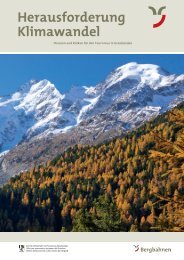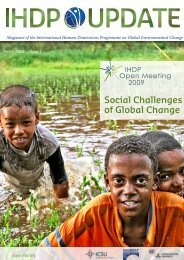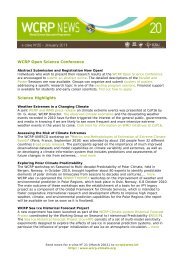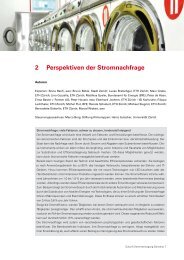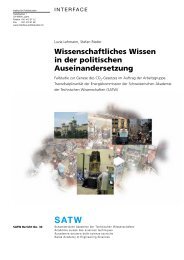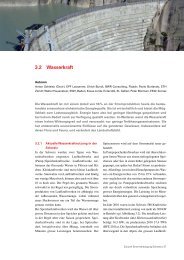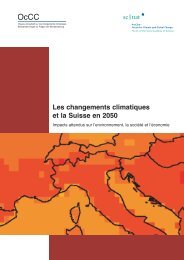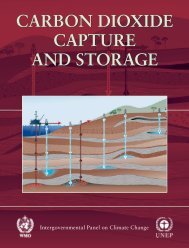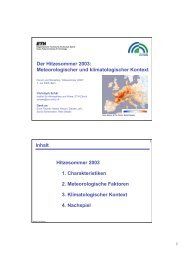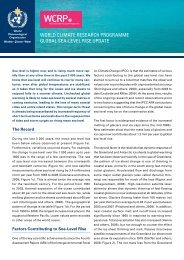Climate Change and Switzerland 2050 - OcCC - SCNAT
Climate Change and Switzerland 2050 - OcCC - SCNAT
Climate Change and Switzerland 2050 - OcCC - SCNAT
You also want an ePaper? Increase the reach of your titles
YUMPU automatically turns print PDFs into web optimized ePapers that Google loves.
44 <strong>Climate</strong> <strong>Change</strong> <strong>and</strong> Switzerl<strong>and</strong> <strong>2050</strong> | Agriculture<br />
2. Domestic plant production<br />
A moderate climate change of less than 2 to 3 °C of the annual mean will have a positive<br />
effect on agriculture in Switzerl<strong>and</strong> in many respects. The potential annual yield of pasture<br />
will increase due to the longer vegetation period. Provided that the nutrient <strong>and</strong> water supply<br />
is sufficient, the potential yield from arable farming <strong>and</strong> fodder production will increase<br />
for many crops. In the event of a strong warming, however, the disadvantages will prevail. A<br />
strong increase in evaporation from plants <strong>and</strong> soils, as well as a change in precipitation, could<br />
result in water shortage at many locations.<br />
In the past, domestic plant production mainly<br />
depended on the suitability of the location,<br />
which is determined by the climate, soil characteristics<br />
<strong>and</strong> relief. Weather characteristics<br />
determined the course of cultivation to a large<br />
extent.<br />
The climate change of the past years has already<br />
had a demonstrable impact on plant production.<br />
In the case of arable crops, the impact of<br />
temperature on sowing <strong>and</strong> harvest time is well<br />
documented. Today, wheat is harvested almost<br />
one month earlier than in 1970, which is partly<br />
the result of the introduction of early varieties,<br />
<strong>and</strong> the grazing of mountain pastures starts 15<br />
days earlier than 30 years ago because mountain<br />
pastures become snow-free earlier. 4 The change<br />
in plant development mainly depends on the<br />
increase in temperature, in particular budding,<br />
blooming <strong>and</strong> ripeness of fruit in spring <strong>and</strong><br />
summer. The phenological autumn phases do<br />
not correlate clearly with weather variables.<br />
Higher temperatures in winter <strong>and</strong> spring bring<br />
about an earlier start of the growing season, e.g.,<br />
for d<strong>and</strong>elions. Trend analyses for the period<br />
1951–2000 have shown that on average plants<br />
bloom 21 days earlier, foliation takes place 15<br />
days earlier <strong>and</strong> leaves change colour 9 days<br />
earlier, while the falling of leaves takes place 3<br />
days later. 5<br />
This trend will continue with future warming.<br />
Depending on the region, the vegetation period<br />
will be extended by about 7 to 10 days per decade,<br />
4 which will result in an increase in the<br />
potential annual production of pastures. 3 With<br />
the decreasing number of frost days, the risk of<br />
frost damage decreases as well, although in the<br />
case of an early start of the growing season, the<br />
danger of late frost damage persists.<br />
A moderate climate warming of less than 2 to<br />
3 °C of the annual mean will have a positive<br />
effect on agriculture in many cases. Model<br />
calculations of potential trends in crop yield<br />
(including cereals) show that Central Europe<br />
will tend to be in a favourable zone until <strong>2050</strong>.<br />
Provided that all soil nutrients are sufficiently<br />
available, an increase in the atmospheric CO 2<br />
concentration, in combination with slightly<br />
higher temperatures <strong>and</strong> sufficient rainfall,<br />
means an increase in the potential yield of<br />
many agricultural crops. The yield increase<br />
caused by CO 2 is, however, minor in comparison<br />
to long-term cultivation effects, <strong>and</strong> the positive<br />
effect on yield will be weakened by more<br />
strongly rising temperatures. 6 At the same<br />
time, a higher CO 2 concentration reduces the<br />
protein content of wheat grains, which results<br />
in a reduction of the baking quality of the flour.<br />
A slight decrease in rainfall in spring <strong>and</strong> summer<br />
will also have a positive effect on farming<br />
at many locations. The number of field workdays<br />
will increase <strong>and</strong> the decrease in soil water<br />
content will favour the use of bigger agricultural<br />
machines. In summer, periods with 2 to<br />
3 consecutive dry days are beneficial to fodder<br />
production because insufficient drying impairs<br />
the quality of hay <strong>and</strong> aftermath.<br />
In the case of a stronger warming of more than<br />
2 to 3 °C of the annual mean, the negative<br />
effects will prevail. A stronger warming means<br />
accelerated plant development, which will result<br />
in yield losses for today’s common varieties, in<br />
particular for cereals <strong>and</strong> grain legumes. 6 Rising<br />
temperatures increase the potential evaporation<br />
from plants <strong>and</strong> the soil surface. Depending on<br />
air humidity, soil moisture, short-wave radiation<br />
<strong>and</strong> the condition of the vegetation, the effective<br />
evaporation <strong>and</strong> therefore the current water<br />
consumption of crops, will also increase. Model<br />
calculations show a considerable reduction in<br />
the mean soil moisture during the vegetation<br />
period. 7 In view of the projected changes in seasonal<br />
precipitation patterns (more precipitation<br />
during winter <strong>and</strong> less during summer), water<br />
shortage could become much more frequent<br />
during the cultivation period at many locations<br />
(see fig. 5).



